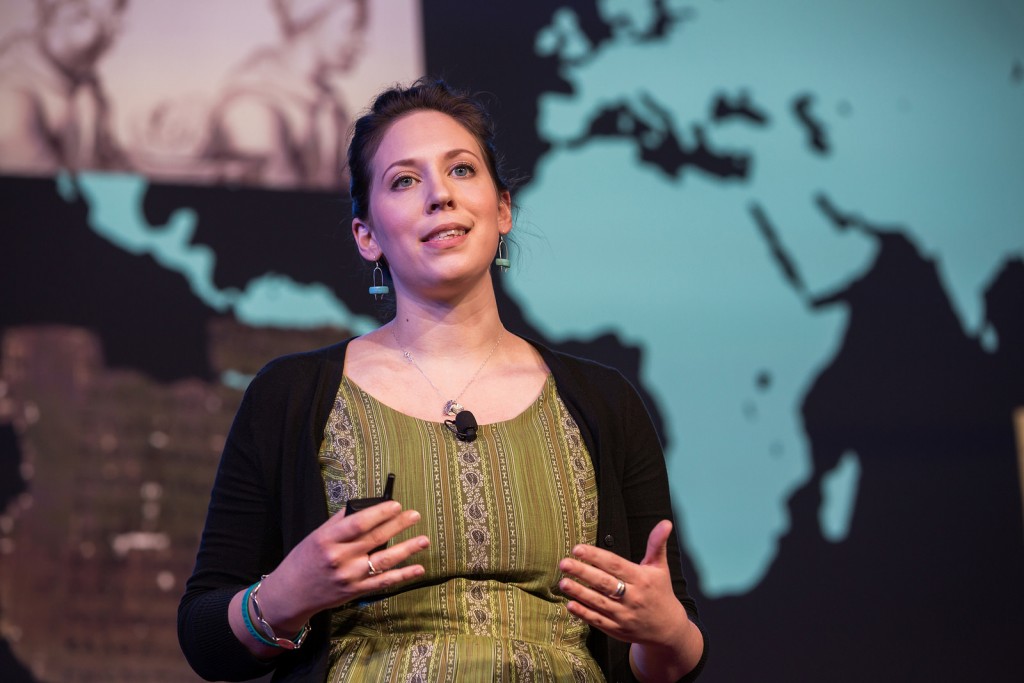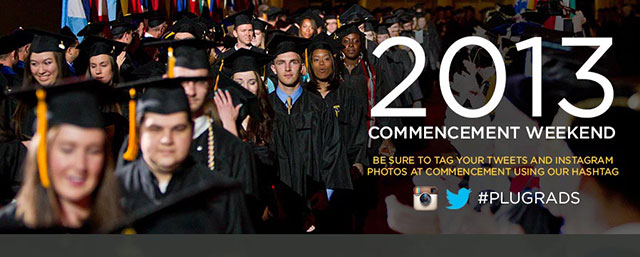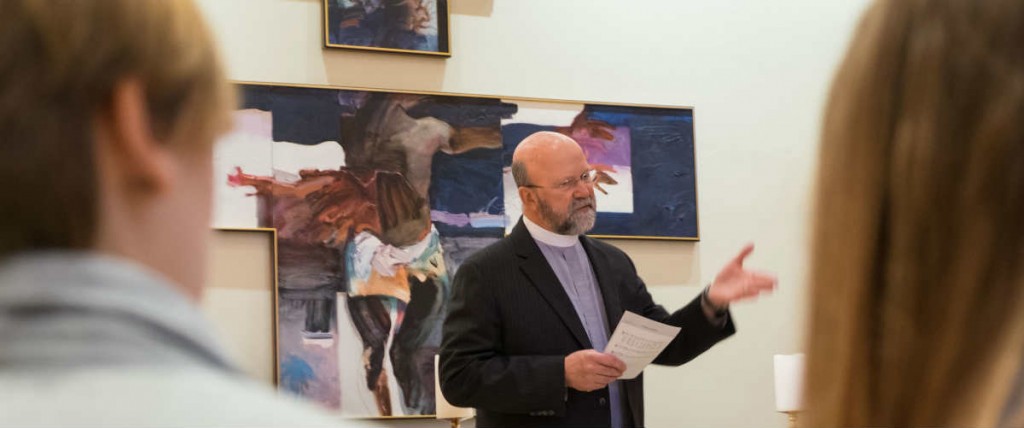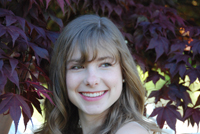Page 34 • (343 results in 0.102 seconds)
-

TACOMA, Wash. (March 5, 2015)— On Saturday, March 21, a diverse and distinguished group of speakers will present “ideas worth spreading” at the fourth annual installation of TEDx Tacoma. Among that group will be three Pacific Lutheran University faculty members representing a variety of PLU’s…
Foundation, where he is responsible for facilitating business-driven strategy for IT solutions through the integration of Project Management and Organizational Change Management. He has previously worked at Enstar Group/Paladin Managed Care Services, the City of Tacoma and Russell Investments. He teaches Information Systems courses to undergraduate and MBA students at PLU.Can you share a very brief synopsis of what you talk will be about? Chavez: I’m going to talk about the 5 million undocumented Latino
-

A National Honor for ‘Digging into Cancer’ ‘Fast Company’ magazine names Hunt one of its 100 Most Creative People of 2014 . A Survivor in the Global Spotlight Katie Hunt ’11 fought cancer at PLU, leads the emerging field of paleo-oncology and wowed the crowd…
student who took advantage of getting a variety of experiences, many of them not associated with formal courses—what I call a student who went the ‘extra mile’ to get the most out of her education.” Hunt didn’t just get an education at PLU; she also got a lot of support. “PLU has been so phenomenal through so much—beginnings, endings and hardships in between,” Hunt said. Health, Hardships and Healing Hardships don’t come much harder: In the summer of 2009, Hunt was diagnosed with cancer. “It was a
-

For the 2012-2013 academic year, 877 students will have graduated from PLU. Spring Commencement takes place Sunday, May 26 in the Tacoma Dome. (Photo by John Froschauer) In their own words Compiled and edited by Chris Albert This spring, new PLU graduates closed a chapter…
discussions, being a member in clubs, and taking courses. And most importantly I have been able to share my experience with prospective students and their families as well as with current students through my campus positions. Being a part of ASPLU, as a senator, also helped me learn about the inter working of the university while building connections. Studying away in Freiburg, Germany was life changing as it allowed me to understand what being a global citizen really meant; I was able to build on my
-

TACOMA, WASH. (May 20, 2016)- It’s the season for awards, banquets, recognition and a whole lot of celebrating for Pacific Lutheran University students as they approach Commencement 2016. The ceremony will mark the culmination of several years of hard work, community involvement and the pursuit…
IHON and the biology department opened the door to some of her best academic experiences at PLU. “I have enjoyed a wide variety of biology courses, taught by dedicated faculty and staff,” McBride said. “I (also) have been challenged to think with a global perspective through the International Honors program.” Through IHON, McBride spent a semester studying at Oxford University in England. She also traveled to Trinidad and Tobago as part of the J-Term study away program. McBride says her experiences
-

TACOMA, WASH. (May 15, 2017)- Classes are over, tests are on the horizon and therapy dogs are waiting in the wings. It’s the end of spring semester, and for several hundred Lutes that means life after college beckons. Pacific Lutheran University students are fast approaching…
said. As she progressed through the nursing program, Mitsui found the relationships with her classmates to be extremely helpful. One of Mitsui’s favorite aspects of the nursing program is the tight-knit community of her cohort, the 40 students with whom she takes a majority of her courses. "It’s almost like I had two families while I was here. Just building those relationships with my teammates and my classmates has been the most memorable."- Takara Mitsui “The teamwork, helping each other out and
-

The following is a wonderful sermon from Interim Campus Pastor John Rosenberg given at Resurrection Lutheran Church in Browns Point on Sunday, May 29th. Is PLU Lutheran Enough? Now That’s a Good Question ( ) Pastor John Rosenberg’s sermon at Grace Lutheran Church in Corvallis,…
have programs and courses about vocation. We have Days of Vocation. We even joke about it (which is how you know its part of the culture!) “How am I being called to serve my neighbor using the gifts, passions, and opportunities that I have been given?” That is a very Lutheran question that we ask all the time at PLU. In fact, we believe that if more people asked that question, the world would be a better place. As our President, Tom Krise, likes to say, “The world needs more PLU.” There are some
-

For the 2012-2013 academic year, 877 students will have graduated from PLU. Spring Commencement takes place Sunday, May 26 in the Tacoma Dome. (Photo by John Froschauer) In their own words Compiled and edited by Chris Albert This spring, new PLU graduates closed a chapter…
students and administrators. Through this first impression, I felt supported by the resources PLU made available to meet my academic and career goals. Also, I knew I would benefit from the smaller class sizes which facilitate a safe place for discussion of topics relevant to the courses. My PLU experience: My experience at PLU has been a journey full of personal growth in many aspects of my life. PLU goes above and beyond with the support and opportunities they provide their students. The faculty truly
-

In their own words Compiled and edited by Chris Albert This spring, new PLU graduates closed a chapter in their lives and prepared to turn the next page. In the following, some Lutes shared their stories of why they came to PLU, what their experiences…
and I knew that the program was well-established and successful. Lastly, but most importantly, I knew that PLU had an extremely strong biology program backed by a wonderful group of dedicated professors who really do care about their students success in courses. To sum this up, by attending PLU I avoided becoming just a student ID number in the computer, but rather I a known recognizable face on my daily visits to Rieke Science Center. My PLU experience: My experience at PLU has been an absolute
-
Originally published in 2005 For two weeks of March, 2000, in the vast jungle along Mexico’s southern border with Belize, I joined a team of biologists and hounds in chasing and capturing a wild jaguar. I was in Mexico as a Fulbright Scholar. It took…
an ethos more favorable to animals, more open to the creature as a living presence. That means more multi-disciplinary study to help us overcome the limitations of perspective in our individual disciplines. It also means more conferences, more panels, more publications, and more courses in universities. I would urge anyone interested in animal issues to read widely (and wildly?) about animals, ranging beyond the confines of particular disciplines. It’s harder to treat a whale as only a linguistic
-
Originally Published 1996 Introduction Like other disciplines such as English and Sociology, Foreign Languages also have a history in the United States which is linked to the changing values of society as a whole. The discipline of foreign language teaching has evolved over the last…
acquisition of basic proficiency in the foreign language. As a result, innovation in foreign language pedagogy is not rewarded with promotion and tenure; in fact, teaching itself is deemed less important than non-pedagogically oriented research. A final consequence of the hierarchical division of labor in foreign language teaching is the preponderance of large multi-section courses, where syllabi and examinations are often course-wide, and where individual instructors (usually female graduate students
Do you have any feedback for us? If so, feel free to use our Feedback Form.


